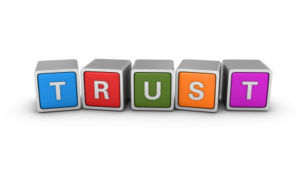A number of polls reveal that leaders rate poorly on measures of trust.
According to a Golin Harris survey of 450 executives at 30 global companies, roughly half of all managers don’t trust their leaders.Small business owners should take note as well.Fairly or unfairly, your behaviors are magnified and weighted, including your values, work ethic, integrity and perceived honesty. Your employees have high expectations of you.According to a Harvard Business Review article, “The Enemies of Trust,” Robert Galford and Anne Seibold Drapeau state there are three different forms of trust:
1. Strategic trust– the trust employees have in the people running the show to make the right decisions.Do top managers have the vision and competence to set the right course, intelligently allocate resources, fulfill the mission and help the company succeed?
2. Personal trust – the trust employees have in their managers.
Do managers treat employees fairly? Do they consider employees’ needs when making decisions about the business and put the company’s needs ahead of their own?
3. Organizational trust – the trust people have in the organization itself.
Are processes well designed, consistent and fair? Does the company make good on its promises.
How would you rate your business in those areas?
Building client trust is a common goal.
In my work with executives, we frequently discuss their desire to build trust with their customers or clients.
They say…
“We want customers to trust us.”
“We want to build credibility so clients will trust us.”
“Creating client trust is a core value in our business.”
But it’s less common to talk about building internal trust.
Instead the focus is typically on strategies or tactics to get the job done.
One of the greatest challenges when internal trust is low, is creating a safe place for employees to open up. If you’re in a senior leadership role, chances are you’re not getting candid feedback — unless a situation has escalated.
You may think the problem has arisen out of nowhere, but it’s likely the problem has been building for a while. It’s been bubbling under the surface. You haven’t seen the poison spreading — jeopardizing all aspects of your business.
Even some 360 assessments don’t reveal the problem. In some cases, they actually make the situation worse by creating more distrust in the environment.
People wonder…
“How could I have received such a rating?”
“Who said that about me?”
Repair the trust deficit.
It requires striking the right balance between personal disclosure and maintaining professionalism.
Studies show that senior leaders who reveal something on the “personal side” do so without undermining their authority. However, guard against excessive personal disclosure.
Show you care. Employees want to feel that they matter.
Empathize. Employees want to know you understand them.
Trust is an intangible necessity in your business.
With greater trust, you’ll reap tangible business benefits: increased productivity, improved performance and genuine employee engagement.
Discuss these issues with your leadership team this week to build the highest levels of trust in your business.
I trust you’ll be glad you did!
—————————————————————————————————————————————
 Deciding whether or not to trust a person is like deciding whether or not to climb a tree, because you might get a wonderful view from the highest branch, or you might simply get covered in sap, and for this reason many people choose to spend their time alone and indoors, where it is harder to get a splinter.~Lemony Snicket
Deciding whether or not to trust a person is like deciding whether or not to climb a tree, because you might get a wonderful view from the highest branch, or you might simply get covered in sap, and for this reason many people choose to spend their time alone and indoors, where it is harder to get a splinter.~Lemony Snicket
